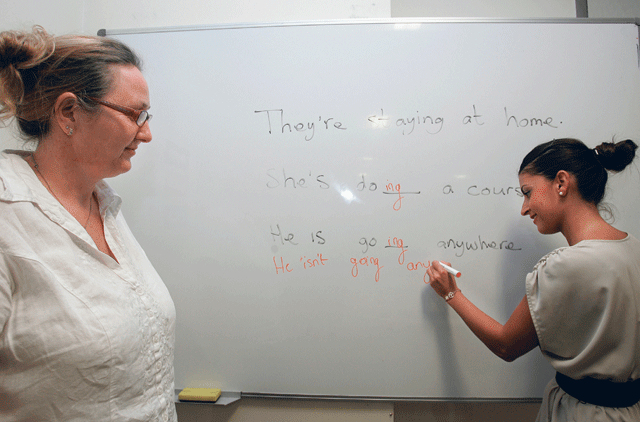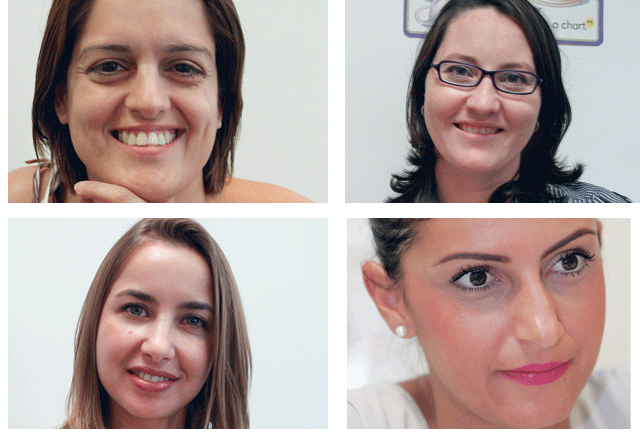
Dubai: What does it mean to have a chip on your shoulder — literally a fried piece of potato lying on your shoulder, or to have a problem that happened in the past, that you can't get over?
Having a chip on your shoulder is just one idiom (a saying with a different meaning to what the words actually say) in English — known to be a complex language.
It is such idioms that prove to be stumbling blocks for those learning the language, as well as other aspects such as homonyms (words pronounced and spelled in the same way but with a different meaning), grammatical quirks and silent letters.
A homophone on the other hand is pronounced the same, but has a different meaning — these can either be spelled in the same way or differently.
When you add in words with silent letters, for example the ‘k' in knight and ‘w' in write, English can be daunting to learn.
Keticia Danish, corporate training coordinator and English teacher at the Eton Institute, Knowledge Village, told Gulf News what her students find most difficult when mastering the global tongue.
"One of the difficulties is getting to understand the idioms of the language. For instance, saying ‘I don't want to step on your toes' doesn't mean I'm literally going to jump on your feet," she said.
The Australian expatriate has been teaching English to both adults and children for 11 years at Eton since April. She said she does have to tone down her accent during classes, to ensure that her students of different nationalities understand her clearly.
Another difficulty for some, she continued, is learning the sounds — particularly for those who speak a language that's very different from English.
"English has a lot of sounds that other languages don't produce, and you'll find that different students from different areas will have problems with certain sounds, and may not with others."
For example, some may find pronouncing the ‘th' sound difficult, while for others it could be ‘f' or ‘p' sounds. Native French speakers sometimes have difficulty pronouncing ‘th' as it's not a sound they'll typically say.
In this case ‘th' may be pronounced ‘z', and a hard ‘h' sound (example in ‘home' or ‘he') becomes ‘e'.
Danish speaks fluent Mandarin, having lived in China and learnt the language from native speakers. She therefore relates to her students as Mandarin has some tones and sounds that just don't exist in English.
The Eton Institute uses the "immersion technique", where students completely immerse themselves in the language as soon as they enter the classroom.
Increased chances
"The teacher speaks purely [in] English with students; it's been proven to actually increase their chances of continuing to the speak the language…," Danish said.
Worldwide, it's estimated that 1.8 billion people speak English — whether as their native tongue or as a second language. It's also used as a Lingua Franca, which is a language spoken between two people who for both it is a second language.
Students at the Eton Institute said that they're trying to improve their language skills to gain opportunities in work and further study.
Mariana Pommerening, 37, Brazilian, has been in Dubai 20 months and has been learning English on and off for a year.
"The accent is very difficult for me... In the building where I live there are lots of Brazilian people so I speak Portuguese a lot. I speak poor English which gets me by day by day, but I want to go to university."
Cristina Caratsch, 34, Mexican, is an out-of-work actress "because of my accent and I don't know where to find work in Dubai," she said.
She's been learning English on and off for five years.
At the Dar Al Ilm school of languages — currently in the Dubai World Trade Centre Exhibition Hall — classes have been conducted for the past 20 years.
Public courses are run six times a year in both groups and one-on-ones.
Observing her private English lesson at the school, Mariam Aykal told Gulf News she finds the contracted form (where ‘they are' becomes ‘they're' or ‘it is' becomes it's) difficult.
"I don't like writing it like this, I'm never using it! At school we didn't learn this," she said, continuing that she lost points at school for using the contracted form.
If you start to mix up the different forms and shapes the English language can take, it's no wonder that it's difficult to master at first. So, they're going over there to have their dinner and it's right for Mr Wright to write about his rite.
Some complexities: Take a ‘bow'
One of the best examples of the complexities of the English language is the word ‘bow'. The word can mean:
- A tied piece of ribbon;
- A weapon that shoots arrows;
- Art of a stringed instrument used to make sound, e.g. cello, violin;
- Bending outwards at the sides, example ‘bow-legged'
- To bend over in taking credit, e.g. actors at the end of a performance
- The front of a ship
- Bough — is a branch on a tree
- Beau — a French word used in English to mean a handsome man
Source: Online Etymology Dictionary
Word watch: Top idioms
- A Leopard Can't Change His Spots: You cannot change who you are.
- A Piece of Cake: A task that can be accomplished very easily.
- Beating Around The Bush: Avoiding the main topic. Not speaking directly about the issue.
- Cry Over Spilt Milk: When you complain about a loss from the past.
- Get Over It: To move beyond something that is bothering you.
- Hit The Sack: Go to bed or go to sleep.
- Hold Your Horses: Be patient.
- Know the Ropes: To understand the details.
- On The Fence: Undecided.
- Over the Top: Very excessive.
- Raining Cats and Dogs: A very loud and noisy rain storm.
- Until the cows come home: A long time.
- Under the weather: Feeling ill or sick.
Source: www.idiomsite.com
Have you tried learning a new language? What challenges did you face? What do you think is the quickest way to become fluent in a foreign tongue?














